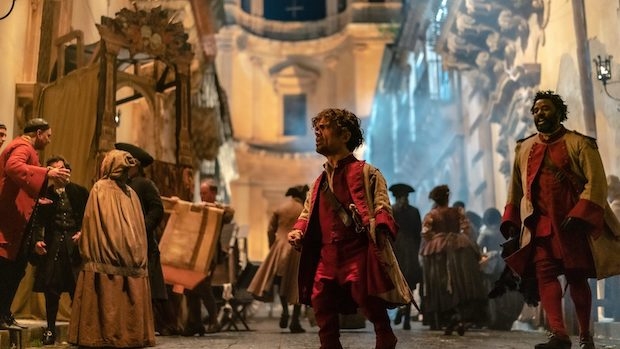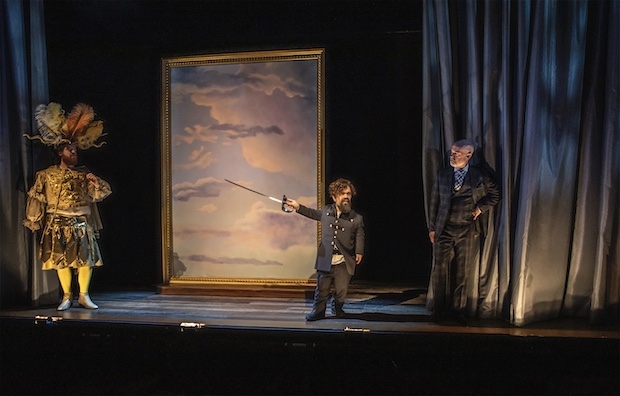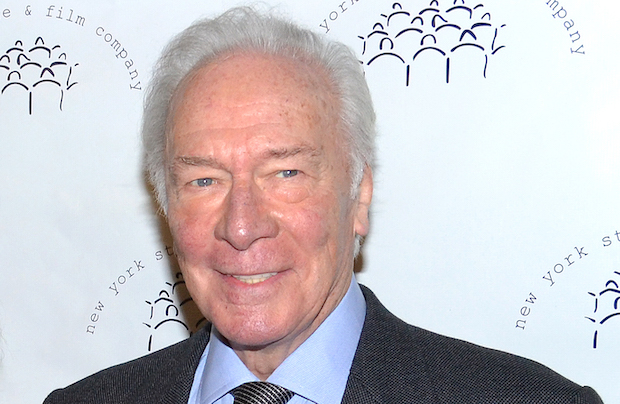Dinklage's Cyrano, New Songs in a Musical Tradition
Edmond Rostand’s classic play has been turned into a tuner several times before.

(© Peter Mountain)
For filmgoers, Peter Dinklage singing the title role of Cyrano may come as a surprise – because they don't think of the Game of Thrones actor as a musical performer; because Dinklage plays Edmond Rostand's 1897 hero without the character's trademark nose; because despite the play's many film incarnations, musical versions haven't been typical onscreen. But musicalized Cyrano de Bergeracs are part of a longstanding stage tradition.
The new film, directed by Joe Wright, is adapted by Erica Schmidt from her stage version, with a score by Matt Berninger and Carin Besser of the National. It played off-Broadway in 2019 at the Daryl Roth Theatre in a New Group production, with Schmidt directing. A developmental production had played at Goodspeed Musicals, in Connecticut, a year earlier. Dinklage played the title role in both productions, while the film's female lead, Haley Bennett, appeared as Cyrano's beloved Roxanne at Goodspeed, and Jasmine Cephas Jones played the role in New York.

(© Monique Carboni)
The stage musical Cyrano, with Dinklage as the reticent romantic, was the most recent version of the story to have a major New York production. The play had previously run on Broadway in 2012 with Douglas Hodge in the title role, and in 2007 with Kevin Kline. As early as 1899, the renowned Victor Herbert wrote a musical version for Broadway. (A musical spoof, Cyrano de Bric-a-Brac, featuring a score by John Stromberg, ran concurrently with the play's original run.) The last musical version on Broadway was from the Netherlands: Cyrano – The Musical, which played during the 1993-94 season, receiving four Tony nominations including Best Musical. But many have forgotten one of only two productions of Rostand's story to secure a Tony: the 1973 musical Cyrano, which earned Christopher Plummer his first Broadway honor in the title role (Jose Ferrer had won, in a tie, for the play in 1947). Playing only five previews and 49 performances, this Cyrano had a score by film composer Michael J. Lewis , and book and lyrics by Anthony Burgess, author of the 1962 novel A Clockwork Orange
Plummer, who died last year, was no stranger to the (non-musical) role, having played it onstage at the Stratford Festival in his native Canada in 1962; he had also played the supporting role of Christian opposite Ferrer for a 1951 television version. In 1972, he was asked to reprise the character at the Guthrie Theatre in Minneapolis by the company's artistic director, Michael Langham, but he declined.

(© David Gordon)
The Guthrie went ahead with that production, which marked the debut of the non-musical Burgess translation of the French play, with Paul Hecht in the title role and Len Cariou as his romantic rival, Christian. But when producer Richard Gregson commissioned the musical version and Langham put it on the Guthrie schedule just a year later, Plummer signed on, directed by Langham; Broadway was already in its sights. The path to New York, however, did not have the panache that the character of Cyrano would have desired.
"They wanted to make it into a musical," says Leigh Beery, who played Roxanne, "which kind of changed the focus of it. We were all kind of into the play-with-music attitude. We'd already decided it was a play with music."
That decision brought with it a major change right after the Guthrie opening.
"A terrible, terrible thing happened," says Mark Lamos, the current artistic director at the Westport Country Playhouse, who was cast shortly before rehearsals began as Christian, replacing Chris Sarandon. "Michael Langham was fired. It was unbelievable that that happened. Then Michael Kidd was brought in."

(© Joseph Marzullo / WENN)
"At the first rehearsal, [Kidd] said, ‘We're going to make this into a musical, not a play with music,'" remembers Beery. "Our faces kind of fell, because we didn't quite know what that meant. The songs that were added, we felt at the time – and this just may not be true now – we felt that they were not important enough to be as good as the ones we had already."
Lamos described the turbulent period at the Guthrie as extremely unsettling. "I would walk on stage at night," Lamos says, "and I wouldn't recognize three or four faces. We would meet at intermission. And they said ‘Yes, we were put in today. At a rehearsal. It was started at 10 This morning.' I became very nervous that I was going to be replaced."
Beery and Lamos both remember the changes in the show, implemented at the Guthrie and in subsequent pre-Broadway runs in Toronto and Boston, as being primarily the addition of dance sequences and a few small adjustments to the songs.
The 1973 version received respectful reviews, but several questioned the necessity of musicalizing Rostand's play, because it already had the sweep and emotion of a musical. "It's odd that anyone should have wished to make a musical of Cyrano because Cyrano de Bergerac is virtually a musical to begin with," wrote Walter Kerr in The New York Times. "The original Rostand melodies are, of course, all verbal melodies, rococo cadenzas that ripple from tongues that still seem to be tasting bon‐bons."
Such notices ignored the long musical tradition surrounding Cyrano de Bergerac, which had also included two operas – one by Walter Damrosch that had premiered at the Metropolitan Opera in 1913 and another by Franco Alfano from 1936, though that only reached the US, at the Met, in 2005. Acclaimed choreographer Roland Petit transformed Cyrano de Bergerac into dance for the Ballet de Paris in 1959, a segment of which was seen in the 1962 film Black Tights.
In a situation that predated the dueling versions of The Wild Party two decades ago, 1973 saw a second musical Cyrano, the other being A Song for Cyrano, directed by and starring Jose Ferrer, who had won an Oscar in the non-musical film 33 years earlier. The score was by the team of Wright and Forrest, the Kismet writers who would achieve new success just a few years later via Grand Hotel. A Song for Cyrano played out-of-town engagements, but folded in the summer, not long after the Burgess and Lewis version breathed its last in New York.
With the new Wright-Schmidt-Dinklage Cyrano turning up on many film critics' 10 Best lists for 2021, perhaps the time has come for a musical Cyrano de Bergerac to take the popular crown from among a crowded field. And despite so many attempts over the years, if it does so, it will win not by a nose, but by a mile.










